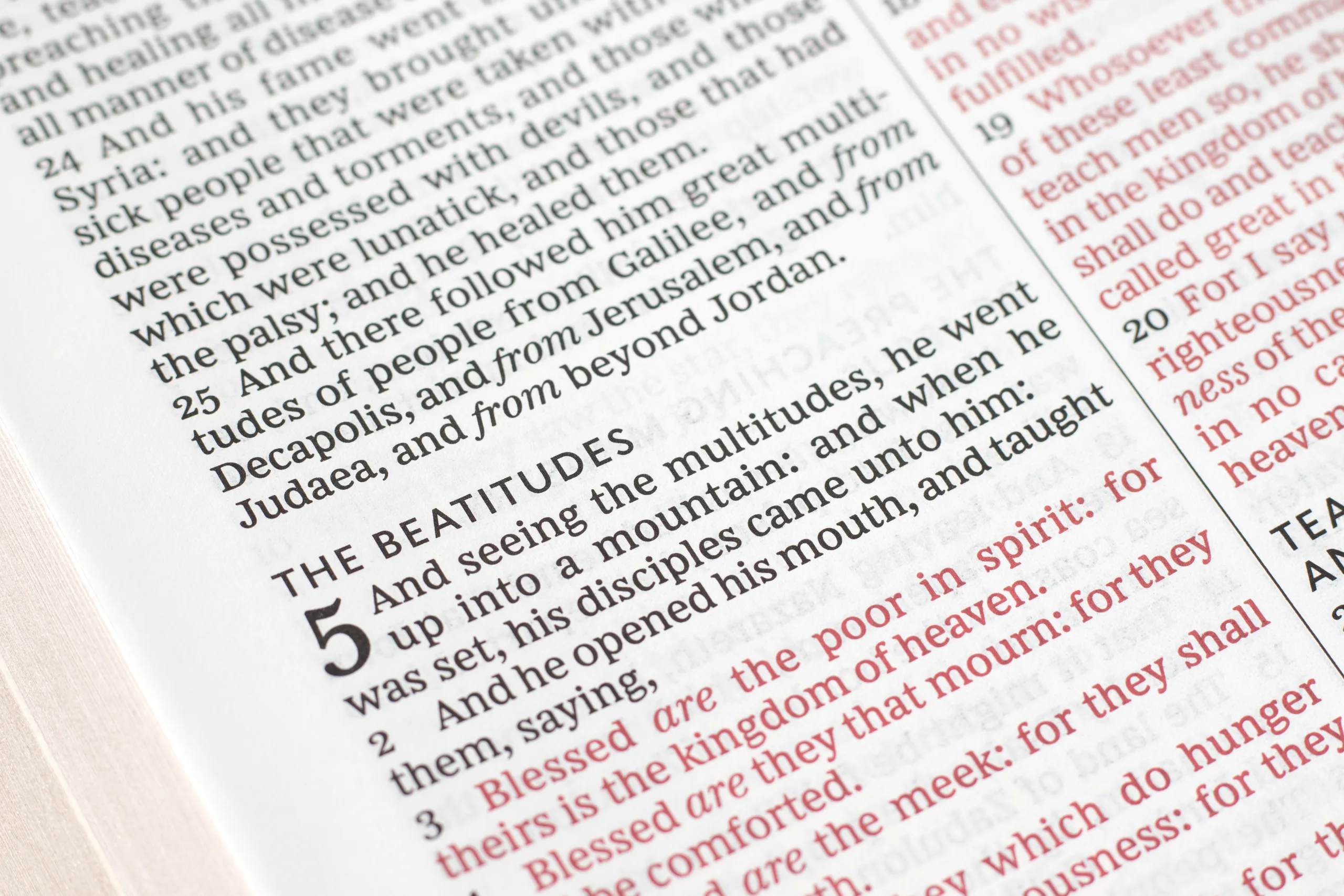Sermon on the Mount (04): The Beatitudes
The Beatitudes, found at the beginning of Jesus’ Sermon on the Mount, offer us a profound portrait of the Christian life. Though simple in structure, their meaning is rich and layered, calling for deep reflection. These eight blessings are more than just encouraging sayings. They describe the kind of life God approves of—the life He desires to build in each of us.
Jesus begins by pronouncing blessings on those who are “poor in spirit,” those who “mourn,” and those who are “gentle.” He speaks of those who “hunger and thirst for righteousness,” the “merciful,” the “pure in heart,” the “peacemakers,” and those who are “persecuted for the sake of righteousness.” This list might seem strange at first—none of these qualities appear desirable by the world’s standards. But they reflect the values of God’s kingdom, not the kingdom of this world.
Each Beatitude presents a spiritual quality and a divine promise. These are not separate lists of different people; rather, they describe the character of every true believer. Just as the fruit of the Spirit is one fruit with multiple qualities (Galatians 5:22–23), so these eight characteristics form a single portrait of the person shaped by the grace of God. The life Jesus describes cannot be achieved by willpower alone. It requires divine intervention. These virtues grow as we walk with Him.
Spiritual Qualities, Not Material Conditions
It’s important to note that Jesus isn’t celebrating poverty or grief for their own sake. He speaks of poverty of spirit—a recognition of our complete dependence on God. He blesses those who mourn over sin and brokenness, those who hunger and thirst for righteousness, not just for food. These are spiritual qualities, not merely external conditions.
While Jesus showed great compassion to the poor and hungry, His primary concern was never material comfort—it was spiritual transformation. His miracles—healing the sick, feeding the multitudes, casting out demons—were signs of the kingdom. But His kingdom is not of this world. Its power is shown in lives changed, not just bodies healed.
Jesus calls us to manifest that same power in our own lives. We are not just called to admire the Beatitudes—we are called to live them.
Blessing vs. Happiness
The word “blessed” in these verses comes from the Greek word makarios. While some translations render it “happy,” this can be misleading. Happiness is a fleeting emotion, often tied to outward circumstances. The blessing Jesus speaks of is deeper. It is about God’s favor—His declaration of approval over a life lived according to His ways.
This distinction is crucial. Our culture often centers life around how we feel. Even in worship, the focus can shift from glorifying God to “how I felt during the song.” But true worship is doxological—it turns our hearts and minds upward to who God is. The same is true for obedience. We do not follow Christ to feel good. We follow Him because He is worthy.
Happiness may come as a byproduct, but holiness is the true goal. Holiness means being set apart. It is about becoming more like Jesus in thought, character, and action. It’s not about personality—it’s about transformation. And that transformation touches every part of our lives.
Present Reality and Future Hope
Are the Beatitudes promises for the present or for the future? The answer is both. In this life, we begin to experience their blessings—comfort, mercy, satisfaction. We receive the Holy Spirit, and we become part of God’s family. But the full realization of these promises is still to come. As Paul says, “We see in a mirror dimly, but then face to face” (1 Corinthians 13:12).
We live in the tension of the “already but not yet.” We are citizens of the kingdom now, but the kingdom has not fully come. We taste the first fruits, but the harvest lies ahead. The greatest blessings await us beyond this life, when we will dwell in the presence of God with His people forever.
The joys of that future life will far outweigh any pain we experience now. Scripture doesn’t give us many details about heaven—perhaps because our minds aren’t yet ready to grasp it. But what we do know is this: one hour in His presence will make every trial on earth seem small by comparison. The Beatitudes point us toward this hope.
Grace, Not Works
It’s vital to remember that the Sermon on the Mount, including the Beatitudes, does not teach salvation by works. It assumes the new birth. These are not instructions for how to be saved; they are descriptions of those who have already entered the Kingdom of God.
That first Beatitude—“Blessed are the poor in spirit”—makes it clear. To be poor in spirit is to admit we have nothing to offer God. It is to come to Him empty-handed, ready to receive His grace. We do not earn His favor; we receive it.
There’s a temptation in all of us to say, “I’d rather do it myself.” But salvation doesn’t work that way. We can’t earn it. We can only receive it. Once we do, the rest of the Beatitudes begin to make sense. We are not called to perform for God’s acceptance. We are invited to live out what He has already given us.
The Beatitudes in Daily Life
The Beatitudes are both responsibilities and privileges. The character traits—poverty of spirit, meekness, mercy, purity, and so on—are our responsibilities. But each comes with a promise—a privilege God grants. The two cannot be separated.
It’s easy to be drawn to the promises: “You will be comforted,” “You will inherit the earth,” “You will see God.” But these blessings are connected to the character traits on the front end. If we want the privileges, we must embrace the responsibilities.
If I advertised a seminar on how to be poor in spirit, mournful, merciful, and persecuted, I’d probably get few attendees. But if I offered a seminar on how to find joy, peace, and fulfillment—people would sign up quickly. The beauty of the Beatitudes is that both lists are actually one. You cannot have the second list without living the first.
In God’s Kingdom, what seems undesirable turns out to be most precious. The path to true joy is marked by humility, hunger for righteousness, and sacrificial love.
Living as Kingdom People
Today, we live in a world where Christian faith is often superficial. Cultural Christianity—especially in the West—can look like the real thing, but it lacks power. It’s easy to go through the motions. But Jesus is not calling us to casual faith. He’s calling us to full surrender.
Persecution has a way of revealing what’s real. Around the world, in places where Christianity is opposed, the Church is growing in power, in commitment, and in depth. True faith always comes at a cost—and that cost refines and strengthens.
The Beatitudes show us what it means to live under God’s rule. And that rule is not restrictive—it’s liberating. As Augustine wrote, “His service is perfect freedom.” When God reigns in our hearts, we become who we were always meant to be.
God has wired us for purpose, meaning, identity, and fulfillment. The world promises these things, but only God can truly deliver. The Beatitudes show us how. They invite us to think well, to love well, and to live well—not by the world’s standards, but by God’s.
To explore the Sermon on the Mount more deeply and discover how to thoughtfully answer the questions below, subscribe to Ken Boa Reflections on Substack.
Questions for Reflection
- How do the Beatitudes challenge your current understanding of what it means to live a “blessed” life?
- In which area of your life do you struggle most to embrace the character traits listed in the Beatitudes (poverty of spirit, meekness, mercy, etc.)?
- What does it mean to you that the Beatitudes are both a present reality and a future hope?
- How are you pursuing holiness in your daily life—not just external obedience, but inner transformation?
Image Credit: <a href=”https://www.vecteezy.



